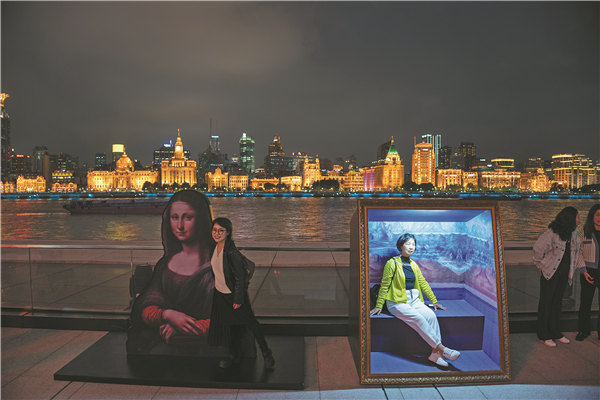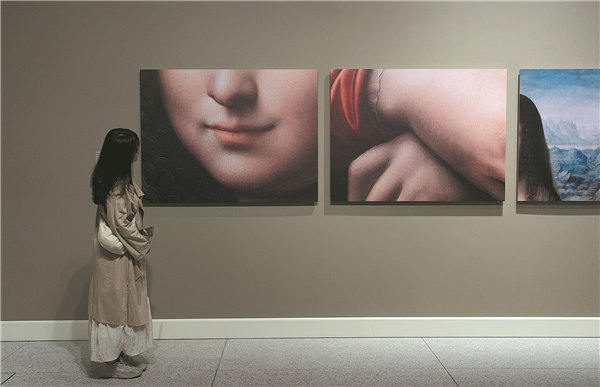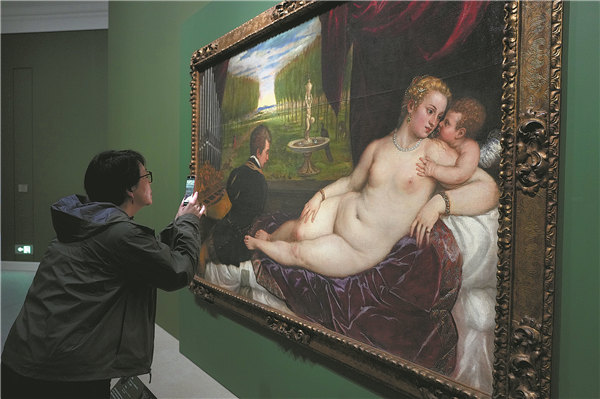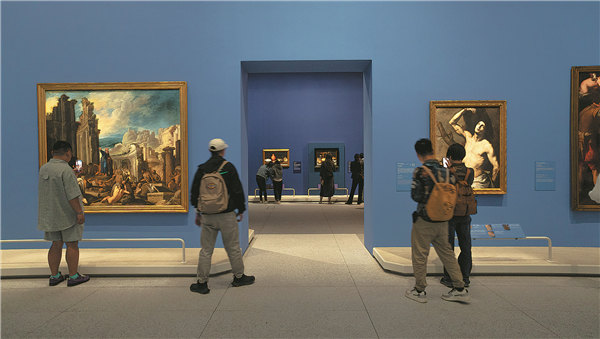Displaying Spain's splendor

Visitors are enthralled by the Ages of Splendor: A History of Spain in the Museo del Prado at the Museum of Art Pudong in Shanghai. [Photo by Gao Erqiang/China Daily]
Prize pictures from Madrid's Prado are largest exhibition by the museum in China to date.
In the collection of Madrid's Museo Nacional del Prado, there is a fine copy of one of the most famous paintings of all time, Leonardo da Vinci's Mona Lisa. It is believed to be the work of students of the Renaissance master, painted in his studio during his lifetime, and includes details and changes that mirror those of the original, which is on permanent display at the Louvre in Paris.
It is one of the paintings on display at Ages of Splendor: A History of Spain in the Museo del Prado, an exhibition running at Shanghai's Museum of Art Pudong from April 23 to Sept 1.
The exhibition features 70 masterpieces from the Prado's collection, among which 16 have never been exhibited outside of Spain, nine have never been lent out by the museum, and over half are being shown in Asia for the first time.
Curated by Pedro J Martinez Plaza of the Prado's 19th Century Painting Conservation Area, Ages of Splendor has been tailor-made for the Pudong museum and will only be shown in Shanghai. It is the largest exhibition of the Spanish museum's collection ever held in China.
The Prado's copy of the Mona Lisa is extremely popular, and many visitors come to the museum just to admire it, Miguel Falomir Faus, director of the Prado, told China Daily before the opening ceremony on April 22.
The painting became part of the Spanish royal collection in the 17th century, and joined the permanent collection of the Museo del Prado when it was founded in 1819.
The last time it left Spain was in 2012, when it was lent to the Louvre in Paris for the temporary exhibition Leonardo's Last Masterpiece: The Sainte Anne.
The Museo del Prado spent a year restoring the painting for the Louvre exhibition, recovering the landscape in the background by removing a black repaint believed to have been done 200 years after the painting was finished.

Visitors are enthralled by the Ages of Splendor: A History of Spain in the Museo del Prado at the Museum of Art Pudong in Shanghai. [Photo by Gao Erqiang/China Daily]
During the restoration process, infrared reflectography and radiography showed that the Prado's Mona Lisa contained the same underlying sketches and corrections as the original, though done in a slightly different style, proving that it was made in the same workshop and at the same time as the original Mona Lisa was painted, says Ma Jue, head of the Pudong museum's exhibition department.
The exhibition in Shanghai dedicates a whole section to the story of the Prado's Mona Lisa. On the ground floor, the In Focus section presents the way it has been exhibited over the centuries, and how studies revealed its origins, and highlights the stylistic difference with the original.
"In this way, we have provided an in-depth interpretation of the Prado's Mona Lisa," says Li Minkun, chairperson of the Pudong museum.
"Visitors can watch a documentary to understand how the studios of Renaissance artists worked, and we also have a special reproduction for the sight impaired to touch and feel. We believe it is a good way to tell the stories behind the artwork, and an interesting journey of discovery for visitors," she tells China Daily.
The rest of the exhibition, located on the third floor of the museum, consists of 10 complementary themes, including The Celebrations in the Spanish Court, The Nobility, the Bourgeoisie and the Royalty in the Spanish Territories, Thought and Spirituality, Sacred Images as Everyday Images and The Beauty of Everyday Objects: The Still Life.
Spanning the 16th to 20th centuries, Ages of Splendor displays masterpieces by 50 remarkable artists from the history of European art, including Titian, Verones, El Greco, Rubens, Zurbaran, Velazquez, Murillo, Ribera, Goya, Fortuny and Sorolla.
"The exhibition has been a great occasion to present both great masterpieces, and also explain the history of Spain," says Falomir Faus. "If you look at Spain on the map, it is a tiny country, but in the 16th and 17th centuries, it was one of the most powerful countries in the world, and spanned four different continents. In some of the paintings, we find objects from different parts of the world, such as porcelain from China in the still life paintings."
The Prado mounted an exhibition in Beijing and Shanghai in 2007, he says, but the current exhibition is bigger and much more ambitious. "Maybe in the future we will visit other Chinese cities," he adds.

Visitors are enthralled by the Ages of Splendor: A History of Spain in the Museo del Prado at the Museum of Art Pudong in Shanghai. [Photo by Gao Erqiang/China Daily]
As one of the finest art institutions in the world, the Museo del Prado is Spain's national art museum. Located in central Madrid, it was built in the 18th century for use as the Royal Museum of Paintings and Sculptures to display the Spanish Crown's art collection. Today, the museum is home to the best and most comprehensive collection of Spanish art.
"At the opening of the Museum of Art Pudong, we reached out to the Prado for collaborations," says Li. "After more than two years of preparation, we have managed to bring some of the paintings best known and loved by the Chinese audience."
One of the most important Spanish artists, and the one most extensively represented at the Museo del Prado, Francisco Goya (1746-1828) has eight masterpieces on show in Shanghai.
In the entrance hallway, the Pudong museum has displayed a chronological table on the wall listing important events in Spanish and Chinese history during the period reflected in the exhibition.

Visitors are enthralled by the Ages of Splendor: A History of Spain in the Museo del Prado at the Museum of Art Pudong in Shanghai. [Photo by Gao Erqiang/China Daily]
IF YOU GO
Ages of Splendor: A History of Spain in the Museo del Prado
Dates: 10 am-9 pm (last admission at 8 pm), April 23-Sept 1
Venue: Museum of Art Pudong
Address: 1F & 3F, No 2777 Binjiang Avenue, Pudong New Area, Shanghai